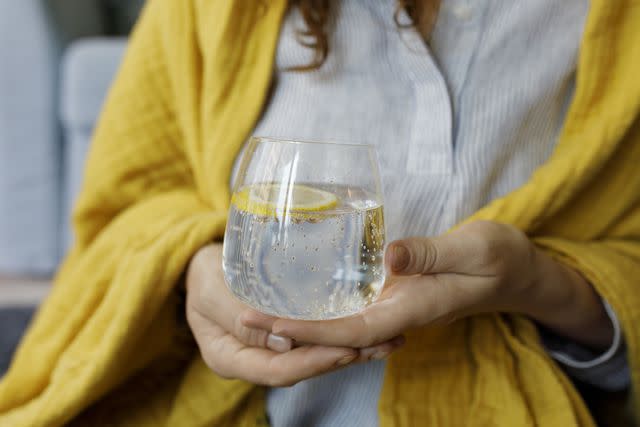Is Carbonated Water Bad for Your Kidneys?
Fact checked by Nick BlackmerMedically reviewed by Kashif J. Piracha, MD
Some people have wondered if carbonated water is bad for the kidneys because it's reportedly been linked to kidney stones. Kidney stones are hard deposits made of minerals and salts that develop inside your kidneys. The theory exists, but there's little evidence to support the link between the bubbly drink and kidney stones.
Carbonated water can lead to gas and bloating in the digestive tract. It can still help you stay hydrated and keep your soda consumption low. Here's what you need to know about carbonated water, your kidneys, and your overall health.

Westend61/Getty Images
Related: Health Benefits of Mineral Water
How Does Carbonated Water Affect Kidneys?
There are no double-blind, placebo-controlled studies, which is considered the gold standard in medical research, to know whether sparkling water causes kidney stones. Carbonated water could still potentially raise your risk of kidney stones, in theory.
Research has shown that the mineral content in sparkling waters varies. This makes it hard to make sweeping statements about how all fizzy water drinks might affect kidney stone risk. Carbonated water generally has certain standard ingredients despite these differences.
One is sodium bicarbonate for fizz. This compound could potentially elevate your chances of kidney stones because a high-sodium diet is a risk factor. Having one glass of sparkling water is unlikely to raise sodium levels too high, but drinking several glasses per day theoretically might.
Fizzy waters may also contain calcium. Calcium from food doesn't impact kidney stone risk. It binds with oxalate, or a food-based natural substance, in the intestine. Without calcium, oxalate passes into the urine, increasing the risk of kidney stones.
Kidney Stone Causes
It's unclear whether sparkling water consumption causes kidney stones. There are several known risk factors for stones.
"The biggest causes we see from a dietary standpoint are not enough water, not enough fruits and veggies, too much dietary sodium, and too much non-dairy animal protein," Wesley Mayer, MD, an associate professor of urology at Baylor College of Medicine, told Health.
Other risk factors include:
Being male
Having a family history of kidney stones
Having certain health conditions, like obesity, bowel inflammation, and some kidney diseases
Taking select medications, including diuretics and calcium-based antacids
How To Prevent Kidney Stones
Here are some general recommendations for preventing kidney stones:
Be cautious about taking calcium supplements, which raise your risk.
Drink enough liquid to pass 2 liters of urine a day.
Eat a diet low in foods that contain oxalate.
Limit your daily intake of protein to a quantity that's no bigger than a pack of playing cards.
Try to avoid foods high in sodium, such as deli meats or pre-prepared foods.
Benefits of Carbonated Water
Carbonated water, in general, might have a few benefits. A study published in 2022 found that people under heat stress had increased brain blood flow, motivation, and excitement when drinking both carbonated and non-carbonated water.
This study, however, was small, non-randomized, and only included healthy, young people. It's unclear what increased blood flow means for overall health, especially in the general population. More research is needed to confirm these benefits.
Drinking sparkling water may actually lower your risk of kidney stones. Staying hydrated by drinking plenty of fluids, particularly water, is a main component of kidney stone prevention.
Tips for Consuming Carbonated Water
You have plenty of options for carbonated waters you might like. Many of these waters are available in flavors like peach, key lime, strawberry kiwi, berry, or cherry. Some sparkling waters come with vitamins, minerals, and caffeine if you're looking for a slight boost of energy.
Carbonated water is a great way to meet your water needs. Remember to drink it in moderation. Drinks with carbonation may lead to excess gas in your digestive tract and damage the enamel of your teeth like soda.
Related: 14 Sugary Drinks To Enjoy in Moderation
A Quick Review
There have been reports of kidney stones following carbonated water consumption, but there's a lack of research to support this link. The connection comes from the theory that this water's sodium bicarbonate content could lead to kidney stones.
Carbonated water might have benefits, but more research is needed. You'll still want to drink sparkling, seltzer, or soda water in moderation as they can increase gas in the digestive tract or potentially erode your teeth.
For more Health.com news, make sure to sign up for our newsletter!
Read the original article on Health.com.

